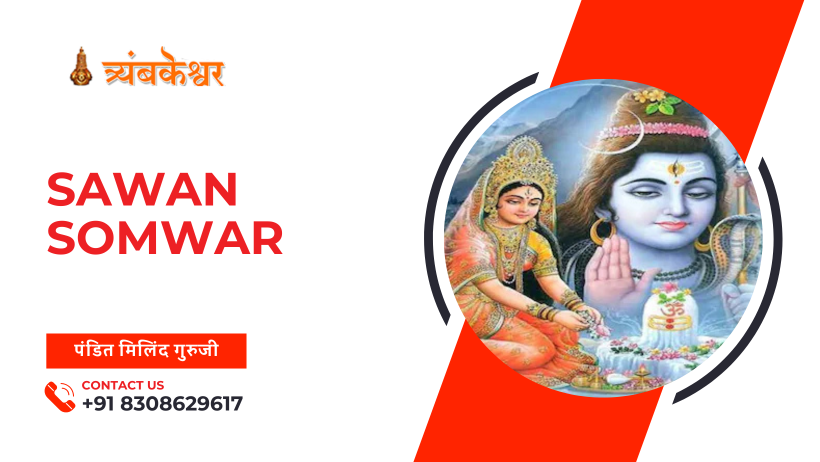

- January 1, 2025
- Pandit Milind Guruji
- 0
Sawan Somwar 2026: Embracing the Divine Mondays of Devotion
Sawan Somwar, observed during the auspicious month of Shravan (Sawan), holds immense significance for devotees of Lord Shiva. Mondays (Somwar) in this period are considered especially sacred, with devotees engaging in fasting, prayers, and rituals to seek the blessings of the benevolent deity. In 2026, the observance of Sawan Somwar offers an opportunity for spiritual rejuvenation and deepened devotion.
📅 Sawan Somwar 2026 Dates
The dates for Sawan Somwar vary between North and South India due to differences in regional calendars.
North India (Uttar Pradesh, Bihar, Madhya Pradesh, etc.):
Shravan Begins: July 30, 2026 (Thursday)
1st Sawan Somwar: August 03, 2026 (Monday)
2nd Sawan Somwar: August 10, 2026 (Monday)
3rd Sawan Somwar: August 17, 2026 (Monday)
4th Sawan Somwar: August 24, 2026 (Monday)
Shravan Ends: August 28, 2026 (Friday)
South India (Maharashtra, Karnataka, Andhra Pradesh, etc.):
Shravan Begins: August 13, 2026 (Thursday)
1st Sawan Somwar: August 17, 2026 (Monday)
2nd Sawan Somwar: August 24, 2026 (Monday)
3rd Sawan Somwar: August 31, 2026 (Monday)
4th Sawan Somwar: September 07, 2026 (Monday)
Shravan Ends: September 11, 2026 (Friday)
🕉️ Significance of Sawan Somwar
The month of Shravan is revered in Hinduism, primarily due to its association with Lord Shiva. According to legend, during the churning of the ocean (Samudra Manthan), a deadly poison emerged, threatening to destroy the universe. Lord Shiva consumed this poison to save creation, and the act is commemorated during Shravan. Mondays, being dedicated to Shiva, gain heightened importance in this month. Devotees believe that observing fasts and performing rituals on Sawan Somwar can lead to spiritual growth, fulfillment of desires, and the removal of obstacles.
🛕 Rituals and Puja Vidhi
Observing Sawan Somwar involves a series of dedicated rituals:
Early Morning Bath: Devotees wake up before sunrise and take a purifying bath, often adding holy water (Gangajal) to cleanse themselves spiritually.
Fasting: A strict fast is observed from dawn to dusk. Some devotees opt for Nirjala Vrat (without water), while others may consume fruits and milk.
Puja Preparation: An idol or image of Lord Shiva is placed on a clean platform. The area is decorated with flowers and lit with oil lamps and incense sticks.
Abhishekam: The Shiva Lingam is bathed with Panchamrit (a mixture of milk, curd, honey, ghee, and sugar) followed by water. Offerings of Bilva leaves, fruits, and flowers are made.
Mantra Chanting: Devotees chant mantras like “Om Namah Shivaya” and recite the Maha Mrityunjaya Mantra to seek blessings.
Reading Vrat Katha: The story associated with Sawan Somwar is read or heard, emphasizing the virtues of devotion and the power of faith.
Evening Aarti: An aarti is performed in the evening, and the fast is broken with a simple, sattvik meal.
🌿 Spiritual and Physical Benefits
Observing Sawan Somwar is believed to offer numerous benefits:
Spiritual Growth: Fasting and prayers enhance self-discipline and bring devotees closer to the divine.
Fulfillment of Desires: It’s believed that sincere observance can lead to the fulfillment of personal wishes and aspirations.
Health Benefits: Fasting can aid in detoxifying the body, improving digestion, and promoting overall well-being.
Emotional Stability: Engaging in rituals and meditation can lead to mental peace and emotional balance.
🙋♀️ Frequently Asked Questions (FAQs)
Q1: Can unmarried individuals observe Sawan Somwar fasts?
A: Yes, unmarried individuals, especially women, often observe these fasts seeking a suitable life partner and blessings from Lord Shiva.
Q2: What if I miss a Monday during Shravan?
A: While it’s ideal to observe all Mondays, missing one doesn’t negate the devotion. You can compensate by fasting on another day or increasing your prayers.
Q3: Are there specific foods to avoid during the fast?
A: Yes, devotees abstain from non-vegetarian food, grains, pulses, and certain spices. The diet is primarily sattvik, focusing on fruits, milk, and simple preparations.
Q4: Can I perform the rituals at home?
A: Absolutely. While visiting a temple is beneficial, performing the rituals at home with sincerity is equally effective.
🧘♂️ Embracing the Essence of Sawan Somwar
Sawan Somwar is more than just a ritualistic observance; it’s a journey of inner transformation and heightened devotion. By dedicating oneself to the practices of fasting, prayer, and meditation, devotees can experience a profound connection with Lord Shiva, leading to spiritual enlightenment and personal growth. As the monsoon rains cleanse the earth, let the observance of Sawan Somwar purify the soul.
